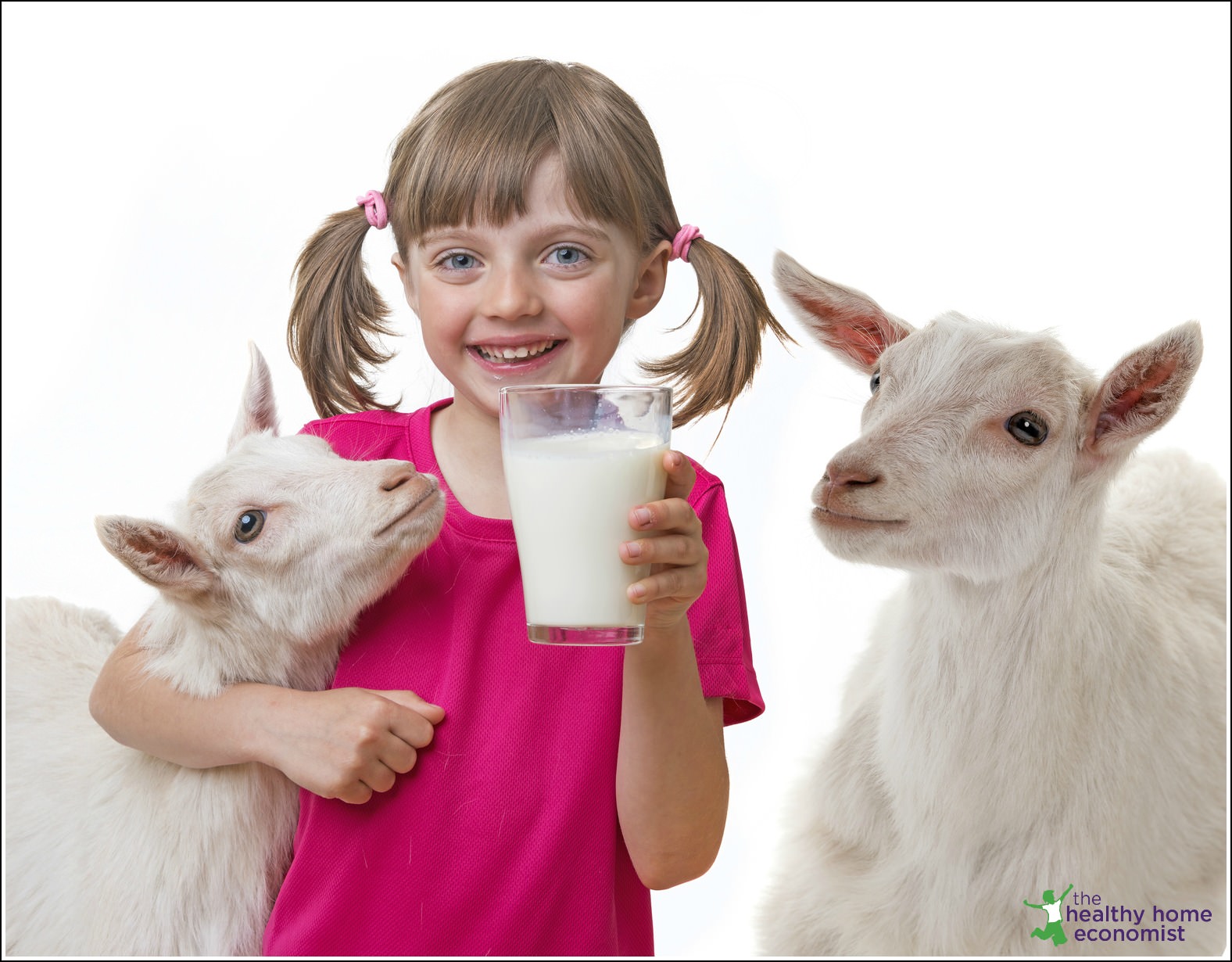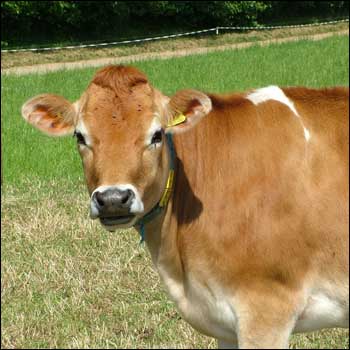Table of Contents[Hide][Show]
 I am fortunate where I live to have convenient access to high quality, farm fresh milk from both cows and goats for reasonable prices. My family enjoys both types of dairy although each member of the family tends to have a preference if given the choice of one over the other.
I am fortunate where I live to have convenient access to high quality, farm fresh milk from both cows and goats for reasonable prices. My family enjoys both types of dairy although each member of the family tends to have a preference if given the choice of one over the other.
One of my kids asked me the other day about goat milk versus cow milk and which was better than the other. Great question!
Goat Milk Advantages
The most significant difference between goat milk and cow milk is that fresh, unpasteurized cow milk forms a distinct creamline at the top and goat milk does not. The reason is that goat milk is naturally homogenized which means the fat molecules are smaller than in cow milk and so remain evenly dispersed throughout the milk. Incidentally, sheep milk is also naturally homogenized.
The smaller size of the fat globules seems to make goat milk more digestible for some people but not all. I personally find no difference in digestibility between the two.
While the protein structure of cow and goat milk is fairly similar, goat milk is missing an alpha casein present in cow’s milk. In addition, when you drink a glass of goat milk and it reacts with the acid in your stomach, the protein curds that precipitate are smaller in size and a bit softer than the ones that form with cow’s milk. This is another reason some folks find goat milk to be more easily digested than cow milk.
 Cow Milk Advantages
Cow Milk Advantages
Cow milk is higher is vitamin B12 which so many people are severely deficient in. Goat milk also lacks folic acid making cow milk more suitable for homemade infant formula in the event the mother cannot breastfeed.
Cow milk is also higher in B6 making it a better choice for pregnant mothers who have morning sickness. I myself suffered from B6 deficiency morning sickness and so found sipping fresh cow milk during the first trimester to bring immediate and welcome relief. Incidentally, B6 is destroyed by pasteurization so any sort of heat treated or pasteurized milk will not help in this regard. The milk must be farm fresh and preferably grassfed.
The Weston A. Price Foundation recommends adding 2 teaspoons organic raw chicken liver, frozen for 14 days, finely grated to each batch of the milk based formula if goat milk is used and encourages egg yolk feeding for babies to begin no later than four months old. If cow milk is used, egg yolk feeding can be started later if desired at 6 months.
Cow milk is usually more readily available than goat milk and is typically a lower cost per gallon making it more suitable for tighter budgets.
Sometimes I’ve heard folks say that they prefer the taste of cow milk because goat milk tastes goaty, but in my experience, goaty tasting goat milk is more a result of quality than anything. The goat milk I buy doesn’t taste goaty unless it is more than a week old (and then it only gets a slight goaty taste) and is generally very similar in taste to cow milk.
Goat Milk vs Cow Milk?
Ultimately, the choice of whether to drink fresh cow or goat milk is a personal preference. In my home, I have both available and while I prefer cow milk, I do enjoy goat milk kefir for my smoothies just to mix things up a bit and provide more variety to my diet. For straight drinking, my husband prefers goat milk but loves cow milk cream on his fruit. My kids generally prefer cow milk although they don’t mind a glass of goat milk when it is really fresh.
So what did I answer my child when he asked whether one milk was better than the other? I told him that it was kind of like the difference between turkey and chicken. They are both yummy and healthy and it’s perfectly ok to prefer one over the other or even drink both if you want to!
Sarah, The Healthy Home Economist
Sources and More Information








Goat milk is easier to digest.
Brenda, actually in Oregon, raw cow’s milk can only be sold on the farm and can’t be advertised. But raw goat’s milk can be sold in a store. I find that really strange! But years ago I used to buy raw goat’s milk in the store in Oregon and raw cow’s milk in the store in California and we never got sick. Thankfully I’ve found a local farmer where I can buy raw goat’s or cow’s milk at his Oregon farm.
Some breeds of cattle have milk that is very similar in composition to goat milk. Dexter cattle are a good example of this. Many people are able to digest Dexter cow milk easily, while the regular dairy breeds’ milk can present digestion problems. I’d also say the A1 vs. A2 factor comes into play here as well.
Also, I want to mention that ‘goaty’ tasting milk is more a matter of the mineral intake of the animal, not necessarily how old the milk is. I have raised milk goats for years, and I currently milk my own cows (yes they are A2 Dexters 🙂 ), who are always on organic green pasture, and every once in awhile the milk starts to taste a little ‘cow-y’ (same concept as goaty milk) when, for an example, in spring the grass starts growing rapidly and the mineral composition of the pasture is changing. When that happens, I know that I need to adjust their mineral rations and it fixes it right up. However I don’t feel bad about drinking that cow-y milk in the meantime, because the cows/goats are still eating the same pasture, and the milk is just as fresh and healthful.
Point being, flavor has more to do with good animal management than how old the milk is or how healthy it is, goat or cow alike.
Another note on the “goaty” flavor… Our local dairy goat farmers say one of the main reasons for a goaty taste is keeping billy goats on the same property as the milk goats. They have no billy goats on the property and have zero goat taste to their raw goat milk
having a buck near the doe does make the milk taste weird. but we’ve gotten the goaty flavor even with no buck on the property, and it has always been fixed by adjusting the minerals.
catz.. how do you adjust the minerals to change the goaty taste? I find this very interesting and would like to know if particular minerals account for what tastes? thanks
Would you trust raw milk from a store? There is an independent natural grocery store not far from my work that has an awesome organic bulk section and a great cheese selection. I noticed a couple of months ago that a small cooler appeared in the cheese section and in that cooler is raw goats milk for sale by the half gallon!
It is from a local maker of soft goat cheese (I love their cheese!), but I worry a little about the longer chain of distribution might make the raw milk more likely to become contaminated. At the same time, I’d like to support them is making raw milk more available, and it is awfully convenient. What do you think? Would you by raw milk from the store?
Retail raw milk sales are legal in Oregon, but I NEVER actually seen a store carry raw milk before!
Would you trust raw milk from a store? There is an independent natural grocery store not far from my work that has an awesome organic bulk section and a great cheese selection. I noticed a couple of months ago that a small cooler appeared in the cheese section and in that cooler is raw goats milk for sale by the half gallon!
It is from a local maker of soft goat cheese (I love their cheese!), but I worry a little about the longer chain of distribution might make the raw milk more likely to become contaminated. At the same time, I’d like to support them is making raw milk more available, and it is awfully convenient. What do you think? Would you by raw milk from the store?
Retail raw milk sales are legal in Oregon, but I NEVER actually seen a store carry raw milk before!
I’m with Becky! Curious about the folic acid (synthetic) vs folate.
We began using goat milk because of lactose intolerant issues, but now we use just goat milk for other reasons.
wouldn’t it be richer in folate, not folic acid? since folic acid is synthetic?
Can I get that in Northern Illinois?